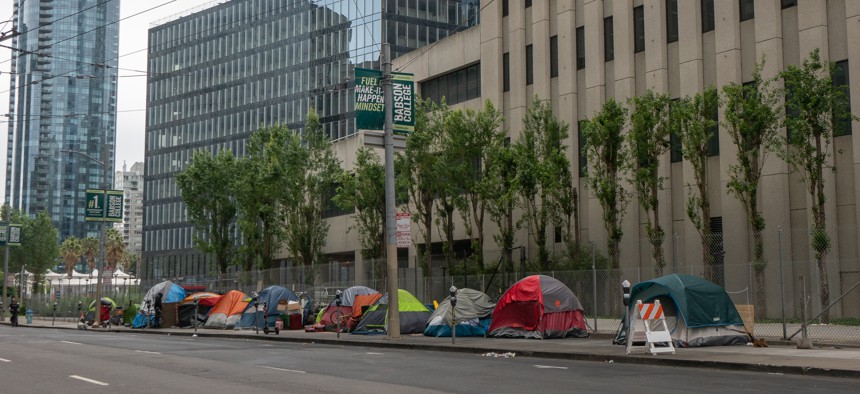Report: Place Governance Must Evolve to Address Homeless Crisis

Homeless persons' tents line Main Street in San Francisco's financial district in 2020. istockphoto.com/DianeBentleyRaymond
Local organizations need to create a more integrated and inclusive service system to meet the needs of unsheltered individuals, according to Brookings.
There has been a national surge in people who are unsheltered occupying public spaces. As downtowns struggle to recover from the ongoing Covid-19 pandemic, the tent cities and encampments that have filled spaces once busy with office workers have become symbols of the virus’s effects, according to a report by Brookings.
While the roots of homelessness are expansive across health care, housing, workforce and geography, the visibility of unsheltered individuals is confined to the parks and plazas where they gather and the organizations that manage those spaces, the report says.
This mismatch perfectly represents the dangers of the rooted patterns of segregation—and why reimagining governance is key to dismantling it, Brookings contends.
Segregation Blinding Americans to Homelessness Crisis
As the country has become more racially diverse, it is still mostly segregated by race at the neighborhood level. And even as overall poverty has declined, concentrated poverty has gotten worse, according to the report.
This segregation inevitably produces unequal outcomes and has helped create the ongoing homelessness crisis. Wealth and opportunity are hoarded in some neighborhoods while poverty is concentrated in others.
According to Brookings, Black communities have a prevalence of alternative financial services like money order services, check cashers and same-day lenders to manage finances. These high-cost, low-quality financial services tend to trap borrowers in cycles of debt, increasing the financial vulnerability—especially among communities of color—and blocking efforts to build lasting wealth.
Between neighborhoods, low wages and high costs produce a shortage of affordable housing, while inadequate social systems—including unemployment insurance, mental health treatment and the criminal justice system—let many people fall through the cracks.
Reforming, investing in and breaking down silos between federal, state and local governance systems—from housing to health care—can help prevent homelessness, Brookings says. The report also states a need to evolve a new generation of hyperlocal place governance organizations that can more intimately see, understand and help respond to the crisis.
Place Governance Key to Addressing Homelessness
Neighborhoods are increasingly governed by structures like private homeowners’ associations, quasi-private business improvement districts or public suburban micro municipalities created through defensive incorporation, the report says. While these organizations typically engage in community functions, the public sector can’t take on maintaining and programming public spaces to small business assistance. Place governance organizations have also often failed to strike a balance that allows public spaces to work for everyone, the report contends.
Meanwhile, many have faced widespread challenges to their legitimacy, transparency, accountability, fairness and capacity, particularly with homeless or other marginalized populations, Brookings says.
There is a gap between the outsized responsibility many of these organizations bear to address homelessness and the capacity of these entities to do so given the complexity of the challenge. They also need to reach across boundaries typically erected by sector (real estate or service provision) and geography (neighborhood, tax district) to create a more integrated and inclusive service system that meets unsheltered individuals, the report says.
For more information from the Brookings report click here.
Andre Claudio is associate editor of Route Fifty.
NEXT STORY: Amid Omicron Uncertainty, States Resist New Mandates





